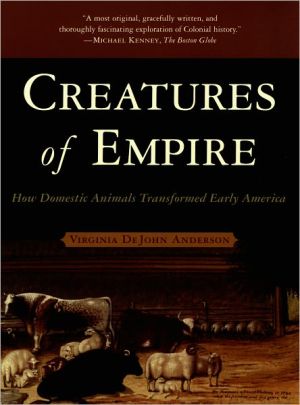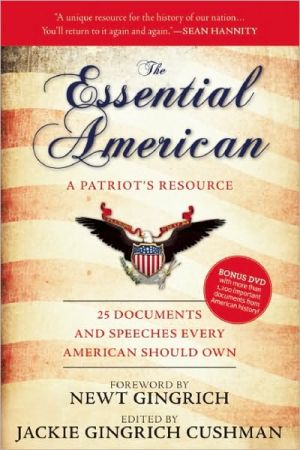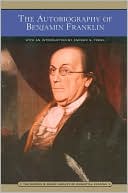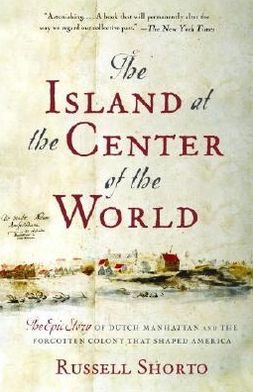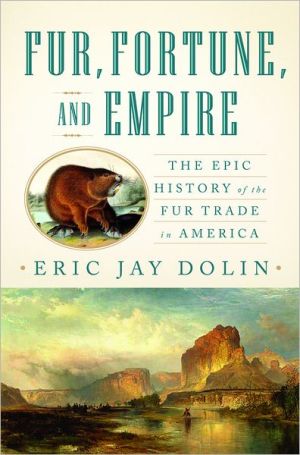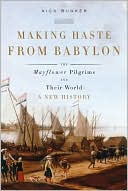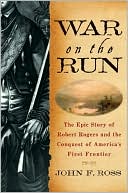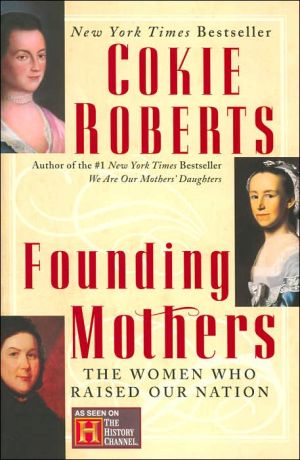Creatures of Empire: How Domestic Animals Transformed Early America
When we think of the key figures of early American history, we think of explorers, or pilgrims, or Native Americans--not cattle, or goats, or swine. But as Virginia DeJohn Anderson reveals in this brilliantly original account of colonists in New England and the Chesapeake region, livestock played a vitally important role in the settling of the New World. \ Livestock, Anderson writes, were a central factor in the cultural clash between colonists and Indians as well as a driving force in the...
Search in google:
When we think of the key figures of early American history, we think of explorers, or pilgrims, or Native Americans—not cattle, or goats, or swine. But as Virginia DeJohn Anderson reveals in this brilliantly original account of colonists in New England and the Chesapeake region, livestock played a vitally important role in the settling of the New World. Livestock, Anderson writes, were a central factor in the cultural clash between colonists and Indians as well as a driving force in the expansion west. By bringing livestock across the Atlantic, colonists believed that they provided the means to realize America's potential, a goal that Indians, who lacked domestic animals, had failed to accomplish. Settlers believed that Indians who learned to keep livestock would also advance along the path toward civility and Christian faith. But colonists failed to anticipate that the animals they hoped would convert Indians instead generated friction between the two people as Indians encountered free-ranging livestock at almost every turn, often trespassing in their cornfields. Moreover, concerned about feeding their growing populations and committed to a style of husbandry that required far more space than they had expected, colonists could see no alternative but to appropriate Indian land. This created tensions that reached the boiling point with King Philip's War and Bacon's Rebellion. And it established a pattern that would repeat time and again over the next two centuries. A stunning account that presents our history in a truly new light, Creatures of Empire restores a vital element of our past, illuminating one of the great forces of colonization and the expansion westward. Library Journal Anderson (history, Univ. of Colorado, Boulder) here joins scholars such as Jeffrey Lockwood (Locust) and Jared Diamond (Guns, Germs, and Steel) in demonstrating that key animals and plants crucially shaped human history. According to Anderson, livestock specifically cattle, pigs, and sheep deserve a place in any account of American history, having "produced changes in the land [and] in the hearts and minds and behavior of" Native Americans and English colonists. With this provocative thesis, Anderson argues that livestock were pivotal historical actors that continually altered Native American-English settler relationships in 17th-century southern New England and tidewater Virginia. Drawing extensively from historical sources to illuminate English beliefs that livestock husbandry epitomized civilization, Anderson richly details Native Americans' and colonists' competing conceptions of nature, land use, and property rights and settlers' domesticated and feral livestock, which provided the pretext for lethal conflicts between the English and Native Americans. Though the thesis is debatable, scholars and interested lay readers will enjoy Anderson's lively, readable narrative. Recommended for academic and public libraries. Charles L. Lumpkins, Pennsylvania State Univ., State Coll., PA Copyright 2004 Reed Business Information.
Prologue : seeing Banquo's ghost1Pt. IThinking about animals1Chickwallop and the strange beast : Indians and animals in early America152The deer with the red collar : English ideas about animals43Pt. IISettling with animals3The company of cattle : domestication and colonization754The wild gangs of the Chesapeake : livestock husbandry in the south1075A world of pastures and pounds : raising livestock in early New England141Pt. IIIContending with animals6Forgiving trespasses : living with livestock in early America1757A prophecy fulfilled : from cooperation to the displacement of Indians209Epilogue : full circle243
\ Library JournalAnderson (history, Univ. of Colorado, Boulder) here joins scholars such as Jeffrey Lockwood (Locust) and Jared Diamond (Guns, Germs, and Steel) in demonstrating that key animals and plants crucially shaped human history. According to Anderson, livestock specifically cattle, pigs, and sheep deserve a place in any account of American history, having "produced changes in the land [and] in the hearts and minds and behavior of" Native Americans and English colonists. With this provocative thesis, Anderson argues that livestock were pivotal historical actors that continually altered Native American-English settler relationships in 17th-century southern New England and tidewater Virginia. Drawing extensively from historical sources to illuminate English beliefs that livestock husbandry epitomized civilization, Anderson richly details Native Americans' and colonists' competing conceptions of nature, land use, and property rights and settlers' domesticated and feral livestock, which provided the pretext for lethal conflicts between the English and Native Americans. Though the thesis is debatable, scholars and interested lay readers will enjoy Anderson's lively, readable narrative. Recommended for academic and public libraries. Charles L. Lumpkins, Pennsylvania State Univ., State Coll., PA Copyright 2004 Reed Business Information.\ \
